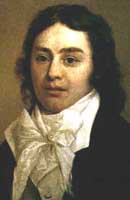Human Life Poem by Samuel Taylor Coleridge
Human Life
If dead, we cease to be ; if total gloom
Swallow up life's brief flash for aye, we fare
As summer-gusts, of sudden birth and doom,
Whose sound and motion not alone declare,
But are their whole of being ! If the breath
Be Life itself, and not its task and tent,
If even a soul like Milton's can know death ;
O Man ! thou vessel purposeless, unmeant,
Yet drone-hive strange of phantom purposes !
Surplus of Nature's dread activity,
Which, as she gazed on some nigh-finished vase,
Retreating slow, with meditative pause,
She formed with restless hands unconsciously.
Blank accident ! nothing's anomaly !
If rootless thus, thus substanceless thy state,
Go, weigh thy dreams, and be thy hopes, thy fears,
The counter-weights !--Thy laughter and thy tears
Mean but themselves, each fittest to create
And to repay the other ! Why rejoices
Thy heart with hollow joy for hollow good ?
Why cowl thy face beneath the mourner's hood ?
Why waste thy sighs, and thy lamenting voices,
Image of Image, Ghost of Ghostly Elf,
That such a thing as thou feel'st warm or cold ?
Yet what and whence thy gain, if thou withhold
These costless shadows of thy shadowy self ?
Be sad ! be glad ! be neither ! seek, or shun !
Thou hast no reason why ! Thou canst have none ;
Thy being's being is contradiction.
Human life is indeed a big contradiction according to S T Coleridge! Rejoicing or loathing in life cannot change death if our life is brief or big in this world that even Milton knew pretty well! Ah! What a bold exposition about human life in this ephemeral world!
..Thy being's being is contradiction. Often times we seem to wonder the true purpose of our existence. If death could but have no effect on us, would life still be of value? This I keep pondering every now and then. Great work Sire!
Life and death both are contradictory and exist only in the absence of the other.
This is a reductio ad absurdum against those who deny the immortality of the soul. There is nothing bleak or nihilistic about this poem. This is the perfect marriage of verse and logos.
Instead of reading this poem as kind advice to a likeminded other, try reading it as Coleridge––who did not believe that once 'dead, we cease to be'––attempting to persuade an atheist that human life is indeed meaningful, and that our life is not 'Blank accident! nothing's anomaly! ' Those who believe, however, that human life is merely 'Blank accident', have no reason by their own premises, Coleridge is arguing, to be sad––or glad.
This poem has not been translated into any other language yet.
I would like to translate this poem
I could not enjoy life as something meaningless- - - - - - -Be sad! be glad! be neither! seek, or shun! Thou hast no reason why! Thou canst have none; Thy being's being is contradiction.